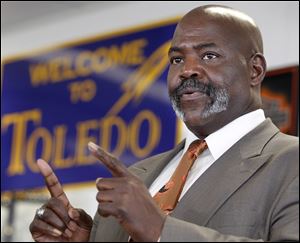
City of Toledo cleared in labor dispute
State board OKs concessions for police command officers
4/29/2011
Toledo Mayor Mike Bell calls the State Employment Relations Board decision a win for the citizens of Toledo who pay its bills.
COLUMBUS -- Thirteen months after Toledo City Council declared urgent financial circumstances and forced concessions on most of the city unions, the State Employment Relations Board ruled that the city did not violate state law.
In a 2-1 decision reached Thursday, the board ruled on a complaint filed last year by the Toledo Police Command Officers' Association. The union alleged unfair labor practice when the city forced financial concessions on members while trying to reduce a $48 million budget deficit.
In a brief statement e-mailed to the city, the board indicated it issued an opinion finding that "the [city] did not violate Ohio Revised Code … when it unilaterally increased the health-care premiums for members of the Toledo Police Command Officers' Association and rescinded [the city's] 10 percent payment into the Toledo Police Command Officers Association's pension fund."
Included in the notification was the board's decision to dismiss the complaint and dismiss with prejudice the unfair labor practice charge.
The question as to the legality of the city's actions has been pending since March 30, 2010, when City Council voted to impose "exigent circumstances" because the city could not meet its financial obligations. Specifically, the ordinance required employees to pay the 10 percent share of their pension contribution and make contributions to their health-care costs, based on a sliding salary scale.
The city administration eventually reached what Mayor Mike Bell called needed midcontract concessionary agreements with nearly all city unions, excluding the command officers association.
The union, which represents 125 sergeants, lieutenants, and captains, subsequently filed an unfair labor practice complaint with the state board.
Thursday, the mayor called the board's decision a "win for the citizens," noting that the more than $1 million that would have been owed had the union prevailed would have come from tax dollars.
"This is not necessarily a win for the city, it's a win for the citizens," Mayor Bell said. "We're fighting to do this balancing act with the budget based on their concern to not have fees or taxes raised in the future and their desire to not cut public safety forces."
The mayor added that the state board's decision helps the city adhere to those resident concerns while giving the city an additional tool to use in negotiations.
Lt. Dan Schultz, Toledo Police Command Officers Association president, said the members of his union have taken "a huge hit out of each paycheck" this past year.
"We're disappointed and no, we have not decided what's next," he said of the decision. "Our executive board will meet, review it, discuss it, and then meet with our attorneys to decide what to do."
Since the March, 2010, declaration, five of the city's unions negotiated Memorandums of Understanding with the city to achieve the necessary cuts in other ways.
Those agreements with the Toledo Police Patrolman's Association, Toledo Fire Chiefs Association, Toledo Firefighters Local 92, AFSCME Local 7, and AFSCME 2058 expired Dec. 31.
This year, the city successfully passed a balanced budget and was able to put $50,000 into a rainy-day fund.
"This isn't something we would do if we had a $1 million deficit, but last year, a $48 million deficit was something we had to address," city spokesman Jen Sorgenfrei said of last year's declaration of exigent circumstances. "Obviously, we would always rather negotiate with our unions like we did with [the others.] Unfortunately, there just wasn't that meeting of the minds with this particular unit."
The Toledo Police Patrolman's Association initially fought the issue by filing a temporary restraining order in Lucas County Common Pleas Court a day after exigent circumstances were declared. Judge James Jensen denied the union's request, saying the issue was one for the state board to decide.
Thursday's decision can now be appealed in common pleas court. A full order is expected to be released by the state board Friday.
Councilman D. Michael Collins, a former police officer and former president of the patrolman's association, said Thursday he is surprised by the ruling.
Acknowledging that he has not read the full order, Mr. Collins said the decision proved to him the belief that public-sector employers are at a disadvantage is unfounded.
He related it to the issues surrounding the recent passage of the much-debated Senate Bill 5, which significantly limits collective bargaining rights for public employees.
Mr. Collins said the decision supported his opposition to that issue.
"What we have in place works," he said.